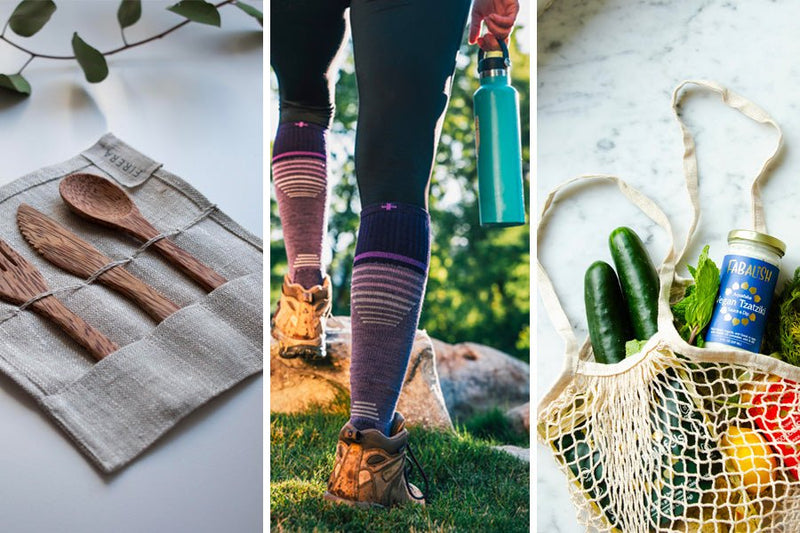
Written By: Kelsey Chernak, Marketing Coordinator
How many Earths does it take to support your lifestyle?
Spoiler: It’s probably more than you think.
One study suggests it would take nearly 5 Earths to support and sustain the human population if everyone lived a lifestyle similar to the average American. You heard that right. 5 Earths.
But what about you? Your ecological lifestyle is determined by your everyday consumption patterns. It accounts for factors such as the kinds of food you eat, your housing type, water usage, trash deposited, and how much you travel. As I was digging into this topic, I came across the Ecological Footprint Calculator. I highly recommend you spare 3 minutes of your day to do this. The results are fascinating, and I bet you’ll be shocked.
I knew my lifestyle wasn’t perfectly environmentally sustainable, but I’ve always been conscious about using reusable water bottles or shutting off the lights when I leave a room. Yet, I was still surprised at my results. I felt startled—maybe a little worried—but also intrigued and inspired to take a step back and examine my lifestyle.
How can I change my daily habits to be eco-friendly? What steps can I take for a more sustainable future? The good news is...I can start making a positive difference right now.
Here are 5 tips for reducing your environmental impact:
Reduce waste
Our planet cannot easily digest plastic. The plastic utensil you used for lunch. The plastic produce bag used during your grocery haul. All 300 million tons of plastic we–as a society–made this year. It’s all piling up in our landfills and oceans and will be there for at least several hundred years. Single-use plastics are convenient but only useful for a matter of minutes. So, if a minor inconvenience can help our future generations live a sustainable life, you can count me in!
Because I don’t want you eating leftovers out of your hands, I rounded up a couple of great single-use plastic alternatives that are practical and great for the environment!
- Disposable Bamboo Plates by Bambu – Made of 100% organic bamboo and biodegrades in 4 to 6 months
- Organic Cotton Mesh Produce Bags by The Earthling Co. – Made of 100% organic natural cotton that is reusable, biodegradable, and fully compostable
- Zero Waste Reusable Bamboo Utensil Kit by EcoRootsShop – Made of ethically sourced, zero waste bamboo and is naturally biodegradable. Includes a knife, fork, spoon, chopsticks, and a straw.
- Assorted Sandwich Bags by Bee’s Wrap – Made of organic cotton coated with jojoba oil and beeswax for a biodegradable, recyclable plastic alternative (Oh, and they have super cute prints!)
- Reusable Water Bottle by Yuhme – Made of 100% sugarcane and fully recyclable, saving 8,975,172 plastic bottles from the landfills in 2018
Reuse + Recycle
Proper recycling can conserve resources, reduce air and water pollution, as well as save space in our already overcrowded landfills. Consciously choosing recycled paper products, eliminating plastic bags, and filling a recycling bin with cardboard, glass jars, and metal containers are great first steps to improve your consumption patterns. In fact, if every household in the U.S. replaced one roll of paper towels with a 100% recycled roll, together we could save 544,000 trees from being cut down. Talk about making a difference.
Find your local recycling center at BeRecycled.org.
Reduce water use
Water is an important element for the conservation of life. We often get comfortable with our daily hygiene habits and unnecessarily use too much water. And if not managed properly, our future generations will be faced with water shortages. One way to implement water conservation habits is to only run your dishwasher or washing machine with a full load. A dishwasher uses about 25 gallons of water per load and a washing machine uses up to 40 gallons.
Pro Tip: You can wear your Sockwell socks multiple times before washing them. Merino wool naturally absorbs and evaporates moisture, eliminating odor-causing bacteria.
Drive less
Transportation is inevitable. We all have places to be, but most cars release harmful pollutants into the air and water. Are you only going a short distance? Consider biking or walking. (This has the added bonus of getting in a little exercise, too!) Live near your coworkers? Ask them about carpooling.
When it comes to travel, it’s easy to find eco-friendly opportunities to reduce the amount of toxins released into the air you and I breathe. You may also consider switching to an electric car. It’s a great investment for not only you but the environment too.
Support local
If you buy it, it travels. And our goods often travel more than we do. When we use goods with imported resources, the materials are being shipped from country to country causing an incredibly long trail of greenhouse gases.
At Sockwell, we’re committed to making decisions that reflect our planet’s best interests by backing the revitalization of the and always being . You, too, can shop green by supporting Made in the USA brands and local businesses to significantly reduce your carbon footprint.






